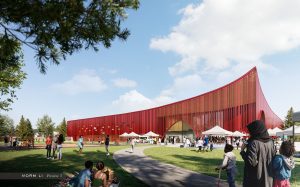A comprehensive report by the Altus Group on the growing oversupply of office space in the Greater Toronto Area caused by the shift to work at home highlights the need for municipalities to rethink policies around future office development.
In Toronto, office vacancy rates have soared from two per cent prior to the pandemic to about 20 per cent today and are expected to rise as many employers continue to adopt hybrid work models.
Fully leased office buildings are critical to the economic health of cities but owners must be able to make quick decisions on reuse or redevelopment when proposed buildings prove “dysfunctional for offices,” says Peter Norman, vice-president and chief economist at Altus.
Titled Office Needs and Policy Directions in the GTA, the report covers an economic analysis of the office supply and demand for the GTA cities until 2041.
While office conversions to other uses such as housing are not always practical, he says municipalities can adjust land-use regulations to permit more residential or uses other than for office space.
The Altus report concludes office vacancy rates will remain between 16.5 per cent and 45.7 per cent if no municipal planning and zoning changes are made.
“It just makes sense that those (municipal) permissions get put in place as quickly as possible,” Norman says.
Altus was commissioned to do the report by NAIOP, a commercial real estate association serving developers and owners in office, industrial and mixed-use sectors.
It is “a rock solid piece of data” to take to municipal governments in hopes of affecting land-use policy changes, says Leona Savoie, a board member and the chair of the government relations committee, NAIOP.
Covering scenarios of hybrid work models where employees are in the office only two, three or four days a week, Altus found there will be millions of surplus office square feet over the next 18 years in all but models where employees are at work four days each week.
But even when employees work from home just one day a week, the GTA would only require 15 million square feet of new office space — about half of the pace of office demand seen prior to the pandemic, the report indicates.
Norman says the urgent need for affordable housing in the GTA is one reason municipalities should rethink office development policies.
Currently, one of the impediments to increasing housing, however, is municipal requirements for the inclusion of office space, he says.
“That either slows down or kills the project or it adds so much cost to the project that it exacerbates the housing affordability situation.”
Savoie, who is senior vice-president of residential for Dorsay Development Corp., says the province’s Bill 97, the Helping Homebuyers, Protecting Tenants Act, to reshape development rules on housing affordability supply, could incentivize municipalities “to add flexibility” to “very rigid” policies on land use weighted to office construction.

NAIOP
She says a multi-thousand-square-foot office space that typically might be planned above new subway stations may now not be seen as the best use of the space.
While the need for office space diminishes, many Class A and even B office buildings “will be fine because a number of businesses still believe they work best in an office environment,” Savoie points out.
“Aging stock, buildings that need a significant amount of capital expenditure to be brought up to a higher standard” largely driven by energy and sustainability targets may not do so well in changing times, she adds.
And Savoie doesn’t see “a huge trend” to office building conversions to residential because retrofits can be impractical and expensive.
Norman, who has been working with a client proposing a housing conversion on a vacant historic office building at Yonge and King streets in Toronto, says the developer’s plans stalled because the city had requested the project include some office space.
Calling it “a very obvious case” for an historic office building conversion to residential, he says the proposed project exemplifies “a very strong ideology” on the city’s part to a fear of losing existing office space.
Savoie says she believes city planners, economic development offices and other departments in GTA municipalities recognize the seriousness of the situation.
“I think it is up to the politicians to say, ‘We need to act on this fast and we can’t overstudy it.’”











Recent Comments
comments for this post are closed